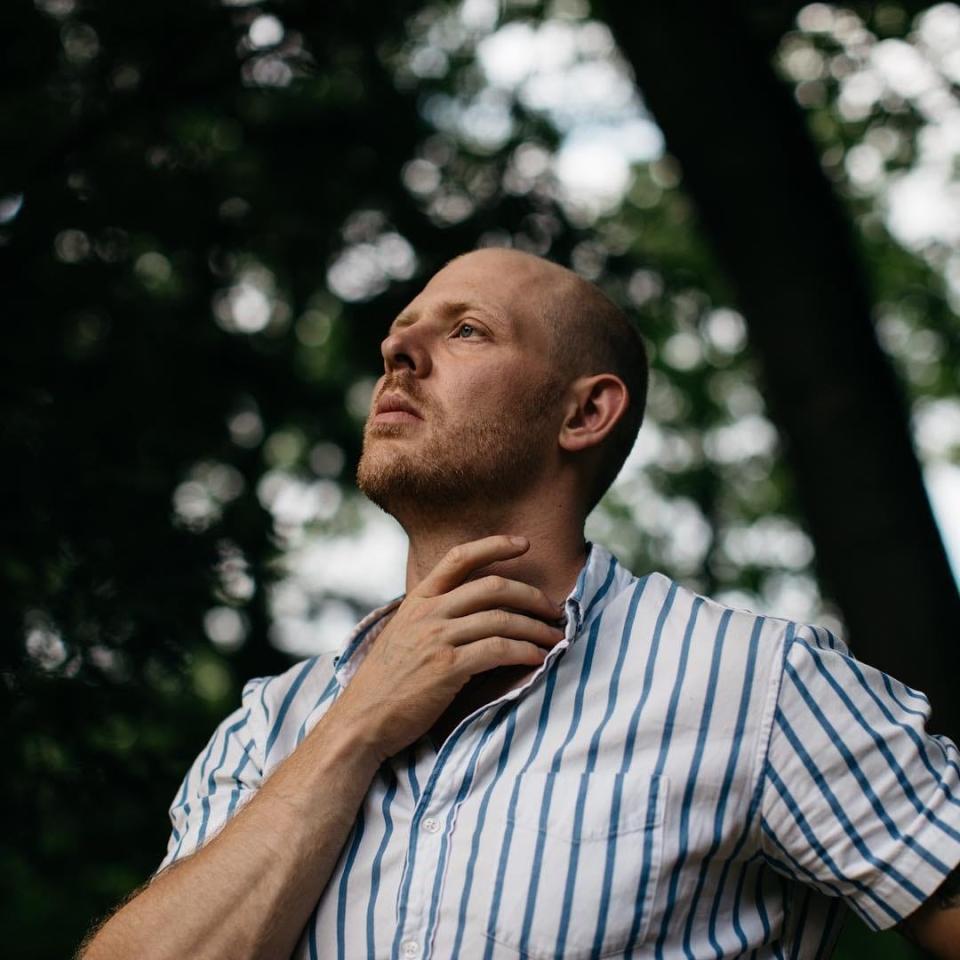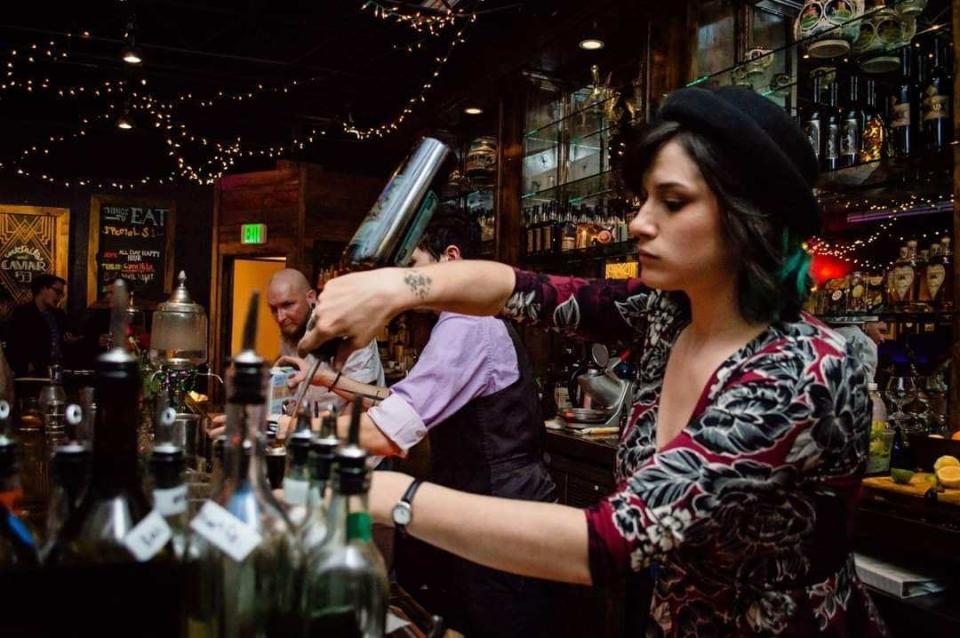Why it's still so hard not to drink
Many Americans have a difficult time not drinking. There's a multitude of reasons – it's fun and it feels good, and there's the influence of genetics, trauma, peer pressure, the pandemic. Drinking really is everywhere, which makes drinking completely normal. We drink in restaurants and bars, at concerts and sporting events, at dinner parties and on children's birthdays. We drink when we fly, get our nails done, while we shop or dance or mingle, or simply wait.
In the last decade, there have been a number of seemingly contradictory trends around Americans' alcohol use. Research shows Americans overall are drinking less, but many are binge drinking more. Women, especially, are drinking and abusing alcohol at higher rates. During the pandemic, nearly 1 in 5 Americans report consuming an unhealthy amount of alcohol.
At the same time, there's a growing movement of sober-curious people normalizing a desire to drink less even without hitting a metaphorical "rock bottom." There has been a significant rise in the accessibility and popularity of alcohol-free booze, inviting many sober people back into spaces that used to feel dull at best and risky at worst.
Biology, human psychology and powerful cultural and economic forces that dictate who controls and promotes alcohol can make it hard to abstain or even to cut back. The mythology of alcohol suggests it's an antidote to the mundanity of our lives. Alcohol-free spaces are scant, which means abstaining from alcohol can translate to abstaining from people, from places, from life. That's a lot of fear of missing out. It's almost impossible to not drink without scrutiny. Forgoing drinking makes you more visible and consequentially more vulnerable. Why, many people wonder, would anyone choose not to?
"Not drinking is really a radical act," said Laszlo Jaress, communications manager with the National Council for Mental Wellbeing who's in long-term recovery. "You are choosing to sort of operate outside of the normal purviews of society, where everything is so oriented around being out in spaces where alcohol is consumed."
The anatomy of a hangover: Here's why your head hurts right now

Alcohol as a 'social lubricant'
PET scans have shown drinking releases endorphins. Drinking feels good and in certain amounts can help us socialize. Alcohol is often referred to as a "social lubricant." When consumed in social settings, it can reduce negative emotions that make people less silent. It makes us more chill, more open, ostensibly more fun.
"Going out" is one of the defining aspects of culture, and alcohol is nearly everywhere people go out. That ubiquity suggests drinking is what people do when they socialize, even if they don't always want to and even if they don't like the way it makes them feel (during or after).
Many people – with and without substance abuse issues – believe alcohol is the answer to anxiety and banality. Nine in 10 adults who drink too much alcohol are not alcoholics or alcohol-dependent, according to a study released by the Centers for Disease Control and Prevention.
"Look at any commercial. We are sold the myth of the night out," Jaress said. "We're sold this concept that we need alcohol to reach these highs, to get away from everyday life. But we're never going to find what they're selling us. Happiness is a moving baseline."
There's an industry invested in getting us to drink. People with substance use disorders have a host of behavioral health issues, but Jaress said the entire culture is susceptible to the ideas big alcohol sells – that drinking is normal, that it helps us fit in, that if you drink, you'll be OK. The global market in alcoholic beverages is expected to grow to $735.83 billion in 2025.
Cultures of consumption work only if people are convinced they can purchase something to make them happy or whole.
Drinking, and especially excessive drinking, are also influenced by unequal power dynamics. Jennifer S. Hirsch and Shamus Khan looked at college drinking in their book, "Sexual Citizens: A Landmark Study of Sex, Power, and Assault on Campus," and concluded that you can't understand campus drinking culture without recognizing the ways it's shaped by multiple forms of privilege.
Wealthy, white young men are not typically worried about being sexually assaulted, about the cost of an ambulance ride, about being killed by police for punching a hole in the wall.
"Women or students of color or sexual minorities, first-generation students are funneled into spaces controlled by older, white, wealthy men, which sets those men's tastes and preferences as the norm for the campus in ways that other students have to fit themselves into," Hirsch said.
For this group, the costs of drinking are lower and the rewards higher. But their choices have impacts on everyone.
"What would the culture of drinking look like if the spaces of socialization weren't controlled by men?" Khan asked.
Feeling left behind on the 'night out'
It's hard to find spaces that aren't centered around drinking. The demands of private spaces are that they are profitable to survive, and selling alcohol contributes to profitability. People mostly socialize in private spaces – bars and restaurants rather than parks or libraries – which means there's a social cost to not drinking, whether you avoid those places altogether or simply spend less time in them.
Kayla Veatch has stopped drinking more than once in her life, but often returned to it because she feared the social cost, that she would miss the promise of the "night out."
Veatch has known Jaress for nearly a decade. They met in Denver three weeks after Jaress quit drinking. Veatch was both amazed and confounded that Jaress could socialize and not drink.
"He would still go out and we would play pool, and I would drink a beer, and he would drink a soda water. It was the first example of someone that was doing well without drinking," she said.
It intrigued her, that someone could stay sober and not retreat from life. Veatch wanted to stop drinking but was surrounded by overconsumption. She resented the hypervisibility around her periods of sobriety. It invited too many questions.
"I might have started being open to less drinking earlier if there were mocktails and nonalcoholic beers that were tasty and options that were not just soda water in a plastic cup that's different from the glass that everyone else is drinking out of," she said. "Things that level the playing field, that leave it to your own discretion whether it's even visible that you're drinking or not drinking is just really important because then it gives people the freedom to make that decision without the scrutiny of being outed."

Veatch has been sober since March. She's kept her job as a bartender and general manager at the Golden Moon Speakeasy and helped to expand their mocktail offerings, which have several ingredients, come in a glass and look just like any other cocktail on the menu.
'There needs to be education that this is a drug'
Alcohol is treated differently from other drugs. Binge drinking alcohol doesn't carry the same stigma as abusing heroin.
"Drinking is something that has always been culturally acceptable," said Natalie Randall, founder of the Sobriety Clubhouse on Clubhouse. "A lot of times when we think of cigarettes, people are like, 'Oh my gosh, this is the harm it can cause me,' but because alcohol is almost seen like food, we don't think twice about it."
‘Gray area’ drinking: Not a diagnosis, but still a problem
Excessive alcohol kills more than 95,000 people in the U.S. each year, according to the CDC. Binge drinking – defined as 4 or more drinks for a woman during a single occasion and 5 or more drinks for a man – is associated with a host of serious health problems, including unintentional injury, violence, sexual assault and chronic disease.
A sobering reality: Alcohol kills more Americans each year than drug overdoses do
"Not enough people think, 'Oh, this is actually a substance I'm putting in my body,'" Jaress said. "There needs to be education that this is a drug. It's even separated from the government perspective: 'Alcohol and other drugs.' It really should be drugs or substances period. When you obscure that fact, I think you miss out on a lot of the health issues."
Alcohol is the most frequently used and misused substance in the U.S., according to the Substance Abuse and Mental Health Services Administration.
'I owe my whole life as it is to being sober'
Randall has abstained from alcohol for nearly eight years. When she stopped, she said alcohol-free spaces would have made things easier. She had to think outside the box. Now she's an ultra-marathoner. She kayaks and does obstacle courses, kickboxing and whitewater rafting.
"My mind is open to how many things there are out there to do, so many things that are not centered around drinking," she said. "It makes life more interesting, because who wants to go to the same bar every day, every week? It gets old."

Veatch said it has been helpful when people praise her sobriety but resist prying.
"I get warm and fuzzies when I say 'I'm sober' and people say, 'Good for you," or, 'That's wonderful,' or something positive and then kind of drop it," she said.
Jaress knows while he has an active social life in New York City, not everyone can go to a club or a bar without the temptation to drink. It's important, he said, to build spaces where alcohol consumption is not expected. That may include a public policy solution. It will also require broader cultural recognition that the pleasure we seek can't always be found at the bottom of a glass.
Across the country, people are trying to create more spaces with less pressure to drink. In Sans Bar in Austin, Texas, patrons socialize with alcohol-free cocktails. In New York City, Reprieve Party runs dry events "open to the clean, sober or sober-curious" who want to "celebrate music, dancing and life." Alternatives like these offer people ways to have fun and build community without alcohol.
Jaress said it takes a lot of self-knowledge and comfortability to be able to not only remain sober in a world that revolves around alcohol but to actually enjoy it, to participate in it, to uncover its potential. The payoff, he said, can be extraordinary.
"I owe my whole life as it is to being sober. When I quit drinking at 25, I didn't want to wake up and be 35 and have wasted my best years in a bar," he said. "Some people drink not to feel, others drink to feel. And a lot of people drink to feel like they're having this crazy wild time and the reality of it is, you don't need to drink to feel that. You just have to be present in your life."
This article originally appeared on USA TODAY: Alcohol is everywhere. Why it's still so hard not to drink, stay sober

